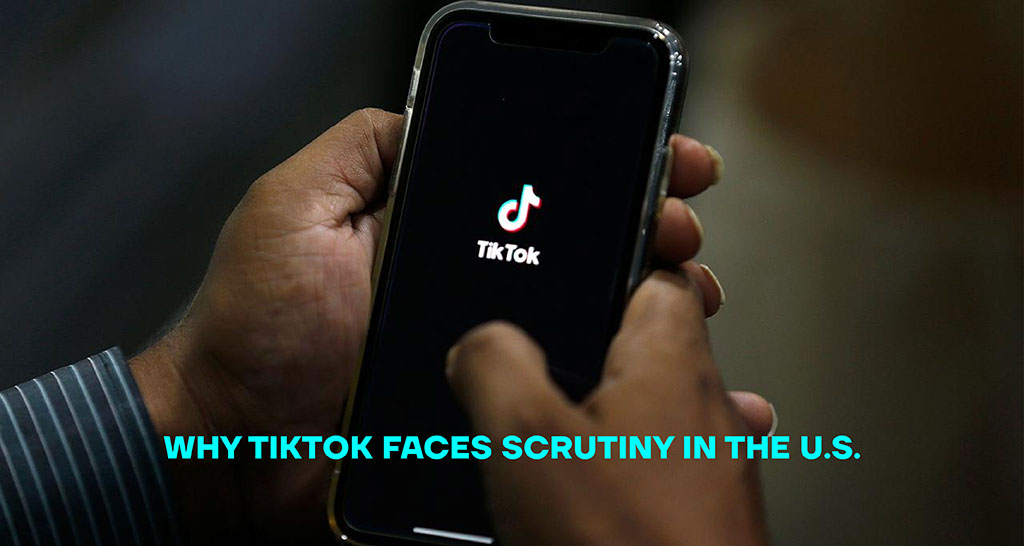TikTok, the widely-used video-sharing platform owned by the Chinese technology company ByteDance, has encountered heightened scrutiny in the United States in recent years. Although it has achieved global popularity, especially among younger audiences, the app’s swift expansion has prompted significant apprehensions among U.S. legislators, national security analysts, and everyday users alike. These apprehensions primarily revolve around issues of data privacy, the possibility of foreign interference, and national security threats. Consequently, TikTok has emerged as a central topic in discussions regarding the convergence of technology, geopolitics, and privacy in the contemporary digital landscape.
- Data Privacy and Security Concerns
The foremost issue prompting examination of TikTok in the United States revolves around data privacy and security. The platform gathers extensive personal information from its users, encompassing details such as location, device specifications, browsing patterns, and even biometric identifiers like facial recognition and voiceprints. As TikTok is a subsidiary of ByteDance, a Chinese firm, numerous U.S. officials express concern that the Chinese government might gain access to this sensitive information due to legal obligations that compel Chinese companies to comply with governmental data requests.
The possibility of data harvesting has raised significant concerns, particularly as the U.S. government apprehends that TikTok may serve as a vehicle for espionage. In 2017, China enacted the National Intelligence Law, which requires Chinese enterprises to “support, assist, and cooperate with the state’s intelligence efforts.” This legislation has intensified worries that ByteDance could be obligated to provide user data to the Chinese authorities, potentially for surveillance activities. Although TikTok has consistently asserted that it maintains U.S. user data within the United States and operates independently of the Chinese government, these claims have not sufficiently alleviated public apprehensions.
- National Security Risks and Influence Operations
TikTok has faced scrutiny not only regarding data privacy but also for its potential role in facilitating foreign influence operations. The application’s algorithm, which customizes content according to user interests, has been alleged to foster divisive political narratives and spread misinformation. Several lawmakers and intelligence officials in the United States have expressed apprehensions that TikTok could be exploited to sway public opinion and jeopardize the integrity of U.S. democracy, particularly as elections approach.
Concerns have arisen regarding TikTok’s extensive user base, which may facilitate the dissemination of propaganda, misinformation, or disinformation campaigns capable of influencing public opinion or inciting social unrest. This issue is particularly alarming due to TikTok’s capacity for rapid virality, which can significantly amplify specific messages or concepts. Although similar apprehensions have been expressed about other social media platforms, the unique factors of TikTok’s Chinese ownership and its potential for data manipulation have rendered the application a more significant focus of examination.
- Legal and Regulatory Challenges
Considering increasing apprehensions, U.S. legislators have undertaken several measures to mitigate the risks associated with TikTok. In 2020, President Donald Trump enacted an executive order aimed at prohibiting TikTok’s operations in the United States, referencing concerns related to national security. The order asserted that TikTok represented a “threat to the national security, foreign policy, and economy” of the nation, largely due to its data gathering methods. While the ban was not ultimately enforced, it ignited extensive discussions and laid the groundwork for persistent legal disputes.
Under the administration of President Joe Biden, the examination of TikTok has persisted, yet the emphasis has transitioned towards a more holistic strategy for tackling data privacy and national security concerns associated with foreign-owned technology firms. In 2023, the U.S. government proposed new legislation designed to mitigate the impact of foreign-owned applications such as TikTok. This legislation, referred to as the “Restricting the Emergence of Security Threats that Risk Information and Communications Technology Act” (RESTRICT Act), aims to empower the government with enhanced authority to assess and potentially prohibit applications identified as national security risks. The RESTRICT Act has been presented as a viable approach to addressing the distinctive challenges posed by TikTok, although it continues to be a topic of vigorous discussion in Washington.
- TikTok’s Response and Public Perception
Considering the scrutiny it has faced, TikTok has proactively defended its operations and responded to various concerns. The company has consistently refuted allegations suggesting that it serves as a mechanism for surveillance or influence by the Chinese government. Furthermore, TikTok has highlighted its commitment to enhancing transparency and safeguarding user data. In recent years, the platform has made significant strides by employing teams based in the United States to manage data security and facilitating independent audits of its data handling practices.
Public perception continues to be polarized despite these initiatives. While a significant number of Americans actively engage with the app and appreciate its entertainment offerings, there are still many who express concerns regarding potential risks. The challenges faced by TikTok in the United States reflect wider apprehensions about the authority and impact of technology firms, particularly those that are foreign-owned. As the U.S. government navigates the increasing sway of platforms such as TikTok, the discourse surrounding the equilibrium between security, privacy, and freedom of expression is expected to escalate in the forthcoming years.
Conclusion
The rapid ascent of TikTok’s popularity has been remarkable; however, its connection to a Chinese parent company has attracted considerable scrutiny within the United States. This examination is driven by apprehensions regarding data privacy, national security, and the potential for foreign influence. Although TikTok has taken steps to mitigate these concerns, its affiliations with China, along with extensive data collection practices and its impact on public discourse, have positioned it at the center of broader discussions about the influence of foreign technology firms in the digital realm. As the United States continues to evaluate the risks associated with TikTok, the resulting decisions are likely to influence the future of global technology regulation and international relations in the context of the digital era.








